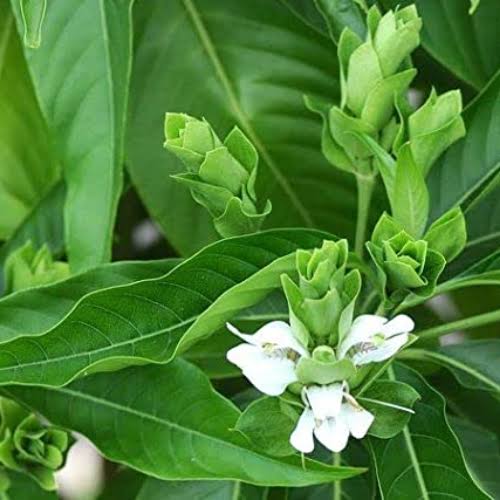Welcome to your holistic living

Botanical Name: Adhathoda vasica Nees.
Family: Acanthaceae
English Name: Malabar Nut
Malayalam Name: Adolakam
Hindi Name: Adosa, Arusha, Rus, Bansa, Adusa
External – External application of leaf paste relieves pain and edema. Paste is indicated in Arthritic pain, skin disorders etc. Its Oil is beneficial in Epilepsy, Tremor etc. Leaf juice is indicated in worm infestation Digestive System – Absorbent, Indicated in bloody diarrhea Circulatory System – good for heart, Constrict blood vessels, Styptic, indicated in bleeding disorders, Bleeding in hemorrhoid’s, Epistaxis, Menorrhagia etc. Respiratory System – Pacify kapha dosha, Liquefy kapha from the respiratory passage and helps to expel it out. Indicated in Cough, Rajayakshma (Tuberculosis). Dhumapana with Vasa leaf powder mixed with Dattura Leaf powder is helpful to reduce asthma attacks. Satmikarana – Indicated in Rajayakshma, Facilitate tissue repair. Excretory system – Flower is indicated in Dysuria, Burning micturition, Diabetes Tapakrama – Indicated in Fever Use in Rasashastra Uses in Rasashastra – metallic Ayurvedic medicines: Vasaka is used in the process of purification of Vimala (Iron pyrite). Vimala is tied in a pack and sudation (Swedana) is given with the leaf juice extract of Vasaka for 3 hours Balances Kapha and Pitta. It is bitter, coolant and pungent. Kshaya – useful in chronic respiratory tract infections, Kasa – useful in colds and coughs. It is useful to relieve burning urinationVasa (Adhatoda vasica), also known as Malabar nut, is a prominent herb in Ayurveda recognized for its strong expectorant, bronchodilator, and anti-inflammatory actions. It is widely used in the management of respiratory conditions such as cough, asthma, bronchitis, and tuberculosis due to its ability to clear excess mucus and ease breathing. The active alkaloid vasicine present in the plant exhibits bronchodilatory and antimicrobial effects, making it valuable for both acute and chronic respiratory ailments. With its bitter and cooling properties, Vasa helps pacify Pitta and Kapha doshas, supporting overall respiratory health and immunity.
Leaf, root, flower, whole plant
Respiratory System Anti-asthmatic / Bronchodilator → Relieves bronchospasm and improves airflow. Expectorant → Facilitates clearance of mucus from the airways. Anti-tussive → Reduces coughing. Mucolytic → Loosens and thins mucus for easier expulsion. Immune System Immunomodulatory → Enhances immune response by regulating cytokine activity and lymphocytes. Musculoskeletal System Anti-inflammatory → Reduces swelling and inflammation. Analgesic → Provides pain relief. Digestive System Digestive stimulant / Appetizer → Supports digestion and improves appetite. Hepatic System (Liver) Hepatoprotective → Protects liver tissue from oxidative and toxin-induced damage. General / Multi-systemic Antioxidant → Neutralizes free radicals and prevents oxidative stress. Antimicrobial → Inhibits bacterial and fungal growth. Anti-pyretic → Helps reduce fever
Vasicine (peganine), Vasicinine, B- Sitosterol, Kaempferol, 3- Sophoroside, Luteolin, Tritriacontane, Adhatodic acid, Carotene, Vasakin, Vasicinol 1= q- Hydroxyvasicinine, Vasicinone, Vit –C, vasicol. Vasicinol, Vaicinolone, Adhatodine, Adhavasinone, Anisotine, Vasicolone, Vasicolinone etc. (Reference: Illustrated Dravyaguna Vijnana, Vol. II, by Dr JLN Shastry)
Rasa: Tikta, Kashaya
Guna: Laghu, Ruksha
Virya: Sita
Vipaka: Katu
Dosha Karma: Balances Kapha and Pitta